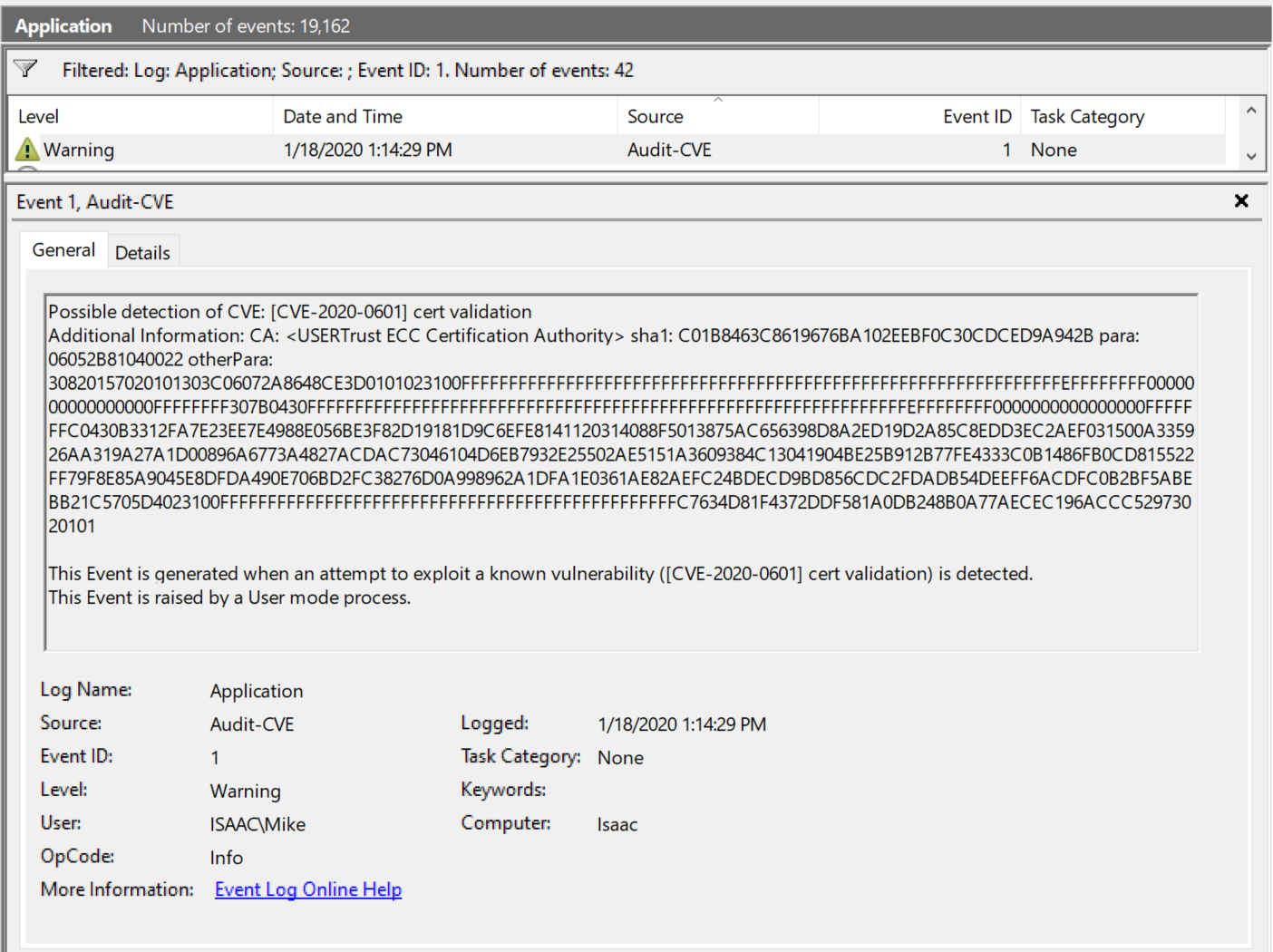Windows Event Log - Audit-CVE
Update: This event appears for both binaries and websites in build 1809 and 1909, but only for binaries in 1903 (not web). So if you're looking for this event and not finding it, that may be why. I have not confirmed this myself, so if someone else comes across this, please let me know in the comments.
Some of you may have heard by now that there's a new Microsoft EVTX log going around. In this particular case, it detects attempted exploitation of CVE-2020–0601. Ideally, this source, "Microsoft-Windows-Audit-CVE" could be used to detect the attempted (or actual) exploitation of any other vulnerability in the future. Here's what it looks like right now:
- <Event xmlns="http://schemas.microsoft.com/win/2004/08/events/event">
- <System>
<Provider Name="Microsoft-Windows-Audit-CVE" Guid="{85a62a0d-7e17-485f-9d4f-749a287193a6}" />
<EventID>1</EventID>
<Version>0</Version>
<Level>3</Level>
<Task>0</Task>
<Opcode>0</Opcode>
<Keywords>0x8000000000000000</Keywords>
<TimeCreated SystemTime="2020-01-18T18:14:29.831868400Z" />
<EventRecordID>19156</EventRecordID>
<Correlation />
<Execution ProcessID="23004" ThreadID="22388" />
<Channel>Application</Channel>
<Computer>Isaac</Computer>
<Security UserID="S-1-5-21-955638165-4017457581-270078328-1001" />
</System>
- <EventData>
<Data Name="CVEID">[CVE-2020-0601] cert validation</Data>
<Data Name="AdditionalDetails">CA: <USERTrust ECC Certification Authority> sha1: C01B8463C8619676BA102EEBF0C30CDCED9A942B para: 06052B81040022 otherPara: 30820157020101303C06072A8648CE3D0101023100FFFFFFFFFFFFFFFFFFFFFFFFFFFFFFFFFFFFFFFFFFFFFFFFFFFFFFFFFFFFFFFEFFFFFFFF0000000000000000FFFFFFFF307B0430FFFFFFFFFFFFFFFFFFFFFFFFFFFFFFFFFFFFFFFFFFFFFFFFFFFFFFFFFFFFFFFEFFFFFFFF0000000000000000FFFFFFFC0430B3312FA7E23EE7E4988E056BE3F82D19181D9C6EFE8141120314088F5013875AC656398D8A2ED19D2A85C8EDD3EC2AEF031500A335926AA319A27A1D00896A6773A4827ACDAC73046104D6EB7932E25502AE5151A3609384C13041904BE25B912B77FE4333C0B1486FB0CD815522FF79F8E85A9045E8DFDA490E706BD2FC38276D0A998962A1DFA1E0361AE82AEFC24BDECD9BD856CDC2FDADB54DEEFF6ACDFC0B2BF5ABEBB21C5705D4023100FFFFFFFFFFFFFFFFFFFFFFFFFFFFFFFFFFFFFFFFFFFFFFFFC7634D81F4372DDF581A0DB248B0A77AECEC196ACCC52973020101</Data>
</EventData>
</Event>
While the Microsoft documentation (#1 below) states that this can have a source name of "Microsoft-Windows-Audit-CVE" or "Audit-CVE", I have only seen this show up in Splunk as the former. Still, I wrote a rule that takes both into account.
Something else that came as a shock to me, and probably will to most other people, is that this isn't the first time Microsoft has written Windows event logs when they detect possible exploitation (ctrl+f for CVE in #2 below). Previously they used "Microsoft-Windows-Kernel-General" Event ID 1. I intend to add this to the Splunk search below that I created to watch for CVE events, but haven't had time yet to test the syntax. When I get it right, I'll update this post, so check back.
1) https://docs.microsoft.com/en-us/windows/win32/api/securitybaseapi/nf-securitybaseapi-cveeventwrite
index=wineventlog (SourceName="Microsoft-Windows-Audit-CVE" OR SourceName="Audit-CVE")
| rex field=Message "(?m)(?<Alert_Info>.*)"
| table _time host EventCode SourceName Alert_Info
Richard Davis at 13Cubed has created an excellent video covering this topic, and his video is where I learned of the previous Microsoft-Windows-Kernel-General usage. Once his video is released to the public, I'll update this post with a link to it as well. (edit: The video is now up here https://www.youtube.com/watch?v=ebmW42YYveI)
Here's a sample event if you want to play with it: https://drive.google.com/open?id=1XNFlUg5hryWWJR1uovd9WSKVzZ0zxmiO

